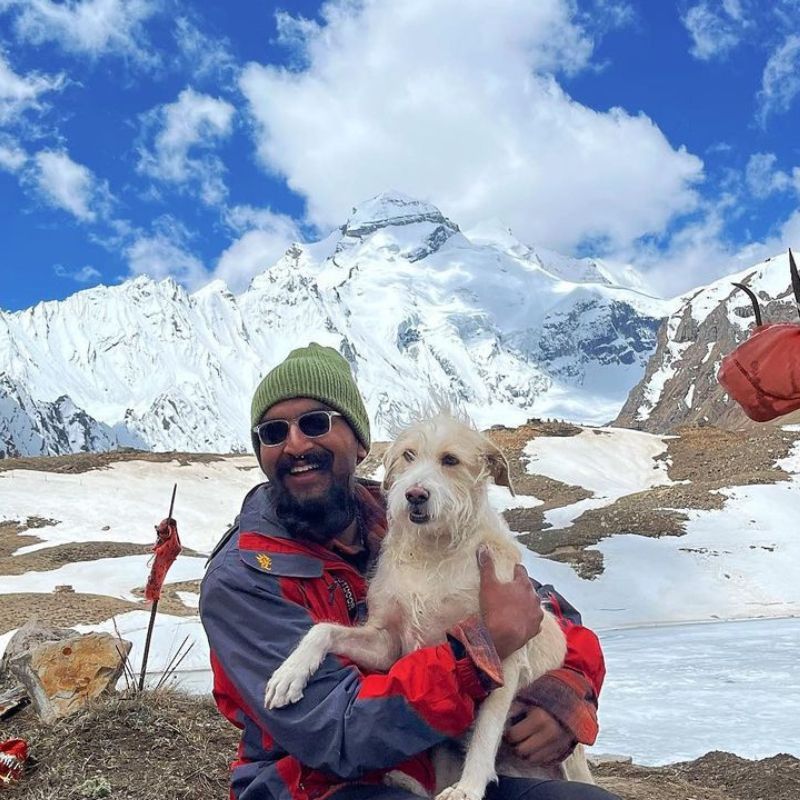
Amrit Pal Singh is a visual artist whose collection of artworks are inspired by nostalgia and driven by a sense of childlike wonder, stemming from the need to play. Having previously done commissioned work for companies like Google, Snapchat, Netflix, Pinterest, and Adobe, he has now forayed to the NFT space where his work, Frida Toy House, was minted in February 2021. Since then, he has created over 92 NFTs with primary sales reaching over a million USD!
Excerpts from the interview with Amrit Pal Singh
T+L India: From film school and motion design animation to NFT, how has the journey been?

Amrit Pal Singh: I have had a knack for drawing cartoons since my school days. I decided to build on my interest in art by studying animation in Delhi and acquiring a post-graduate degree in motion design and animation from Vancouver Film School. I could have entered the mainstream advertising industry but chose to venture into designing mobile apps instead. A passion for doing my own projects pushed me to start my own studio. In the beginning, I created interactive storybooks and started a travel blog. At its peak, the blogs had 50 travel guides written in collaboration with locals from different cities. I went on to head a fintech company but got burnt out very soon. I wanted to return to fun, creative work and started making card games. During the COVID-19 pandemic, I worked on 3D illustration projects, some of which became viral. One of these projects was Toy Room, inspired by movies and paintings. That was the beginning of my pet project, Toy Faces.
T+L India: When and how did the idea of digital portraiture occur to you?
Amrit Pal Singh: In 2020, when people were spending more time at home due to the pandemic, I noticed a growing interest in digital identity concepts. That’s when I came up with the idea of Toy-like portraits. Google commissioned some of my portraits, and galleries began auctioning them. I have created Toy Faces of famous artists like Frida Kahlo, Van Gogh, and MF Husain. Some of these portraits were sold as NFTs. My collection is global, and I have done numerous exhibitions, sometimes printing them on huge canvases. I have even created physical models of the portraits. My audience now consists of individual art collectors, primarily international.
T+L India: How do your travels influence your work?

Amrit Pal Singh: If I hadn’t travelled so much, I wouldn’t have gotten such broad exposure to countries and their cultures. Travelling is a big inspiration for my work. It helps me create globally appealing art.
T+L India: What was your first breakthrough?
Amrit Pal Singh: My first breakthrough came during the first three months of the COVID-19 pandemic when I was featured by media houses. These publications found me through social media.
T+L India: Design innovation in the world of digital avatars is about…

Amrit Pal Singh: For me, design innovation in digital avatars is about diversity. Traditional digital avatars are primarily Caucasian. I wanted to change that by creating avatars with different skin tones and eye colours. I also noticed a need for 3D illustrations featuring characters wearing turbans, so I also decided to include that. I aim to blur the lines between design, illustration, and art by creating vibrant and colourful avatars. One of my favourites is a fluorescent and animated Samurai avatar. Before working on an avatar, I make a mood board and try to understand its symbolism. For the Frida Kahlo avatar, I have focused on her unibrow and used flowers and skulls as props. The fascinating part of every creation is that they all have standard eyes, noses, and mouths. The challenge is to play around with silhouettes and accessories to create a new, unique avatar each time. These days, I am working on my latest project, Toy Birds, which includes pigeons and crows. This project is semi-autobiographical and will be released in April.
T+L India: How do you manage the pressure of keeping up with fast-changing technology trends?
Amrit Pal Singh: Most creatives worry about AI, but I have embraced technology and tried incorporating it to improve efficiency. I leverage technology by experimenting with it and seeing where it fits best.
T+L India: What are your sources of creative inspiration?

Amrit Pal Singh: Fortunately, my city, Delhi, is a vast storehouse of history and heritage architecture. I make it a point to explore the city on weekends with history walks. I also find inspiration in parks and nature. I watch at least five movies a week and read many books. I absolutely love the work of Hollywood art director Wes Anderson.
Art is another excellent source of influence for me. The first Toy Room that I created was based on Van Gogh’s Bedroom. During the pandemic, I got a replica of that painting and made it into a 3D illustration.
T+L India: What factors have played a role in your success story?
Amrit Pal Singh: There has always been a lot of experimentation in my creative journey. If I look back now, I can easily connect the dots. I have made some calculated decisions that were financially sound yet passionate. I always believed in the leap of faith for a new twist in my path. Many of these efforts have paid off. I can start as many as 100 projects simultaneously, even though I may only finish 10. It is essential to show up consistently and try new things. Life has not been a cakewalk, though. I’ve been burnt out twice, so I go slow, take breaks to recharge and travel frequently. Hustle culture doesn’t work for me, but I have learned that marketing, pushing, and showcasing are essential for success.
T+L India: What would you consider to be your most significant achievement?
Amrit Pal Singh: Creating Toy Faces has been my most significant achievement. When I started, I wasn’t sure who would be interested in this art, but it has resonated with many people. It began as a small project but has grown beyond my wildest dreams. I had never imagined that it would take this turn. Even my family was amazed by its success.
T+L India: Amrit Pal Singh, a decade later, would be…
Amrit Pal Singh: I like to be fluid and go with the flow. Everything evolves in the digital space, so the biggest thing for me would be to do projects that keep me creatively fulfilled.
All photographs courtesy Amrit Pal Singh
Related: Conservation Through Comics: How Artist Rohan Chakravarty Draws Attention To Eco-Issues










